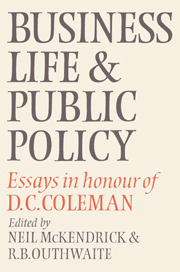Book contents
- Frontmatter
- Contents
- Preface
- List of contributors
- 1 Piscatorial politics in the early Parliaments of Elizabeth I
- 2 Marriage as business: opinions on the rise in aristocratic bridal portions in early modern England
- 3 Age and accumulation in the London business community, 1665–1720
- 4 The use and abuse of credit in eighteenth-century England
- 5 Convicts, commerce and sovereignty: the forces behind the early settlement of Australia
- 6 ‘Gentleman and Players’ revisited: the gentlemanly ideal, the business ideal and the professional ideal in English literary culture
- 7 The City, entrepreneurship and insurance: two pioneers in invisible exports – the Phoenix Fire Office and the Royal of Liverpool, 1800–90
- 8 ‘At the head of all the new professions’: the engineer in Victorian society
- 9 Bernard Shaw, Bertold Brecht and the businessman in literature
- 10 Lost opportunities: British business and businessmen during the First World War
- 11 Ideology or pragmatism? The nationalization of coal, 1916–46
- Bibliography of D. C. Coleman's published works
- Index
4 - The use and abuse of credit in eighteenth-century England
Published online by Cambridge University Press: 07 October 2009
- Frontmatter
- Contents
- Preface
- List of contributors
- 1 Piscatorial politics in the early Parliaments of Elizabeth I
- 2 Marriage as business: opinions on the rise in aristocratic bridal portions in early modern England
- 3 Age and accumulation in the London business community, 1665–1720
- 4 The use and abuse of credit in eighteenth-century England
- 5 Convicts, commerce and sovereignty: the forces behind the early settlement of Australia
- 6 ‘Gentleman and Players’ revisited: the gentlemanly ideal, the business ideal and the professional ideal in English literary culture
- 7 The City, entrepreneurship and insurance: two pioneers in invisible exports – the Phoenix Fire Office and the Royal of Liverpool, 1800–90
- 8 ‘At the head of all the new professions’: the engineer in Victorian society
- 9 Bernard Shaw, Bertold Brecht and the businessman in literature
- 10 Lost opportunities: British business and businessmen during the First World War
- 11 Ideology or pragmatism? The nationalization of coal, 1916–46
- Bibliography of D. C. Coleman's published works
- Index
Summary
It is a commonplace that in eighteenth-century England all businessmen made frequent use of credit. The financial underpinning of economic activity at the time has increasingly been seen in terms of its widespread use. It was business historians, such as Professor Ashton, who first stressed its significance. The rather atomized picture of credit generated by business histories gradually became more organized, partly to qualify the insistence of both Lewis and Rostow that a rapid expansion of fixed capital formation was a central feature of the growth process. As Crouzet pointed out, ‘This new view of the capital structure of eighteenth-century business leads us to reconsider the problem of financing industry, this time emphasizing the importance of trade credit (or book debt).’ Such borrowing and lending often took place within well-established lines, so that by 1800 something approaching a system of credit can be said to have existed. Recent work has confirmed that many firms had more of their assets tied up in credit than in capital and that, particularly in the second half of the century, in many areas there existed a developed network for working capital. So successfully has credit been championed that historians looking at other aspects of eighteenth-century England have also stressed its significance. Professor Pocock, for example, has partly described the early eighteenth-century debate between Court and Country ideologies in terms of their discussion of it. And Professor Brewer has taken it further, from the history of political ideas to the history of politics itself, arguingthat the politicization of shopkeepers and tradesmen in mid-century was helped by their struggles with credit.
- Type
- Chapter
- Information
- Business Life and Public PolicyEssays in Honour of D. C. Coleman, pp. 64 - 78Publisher: Cambridge University PressPrint publication year: 1986
- 14
- Cited by



